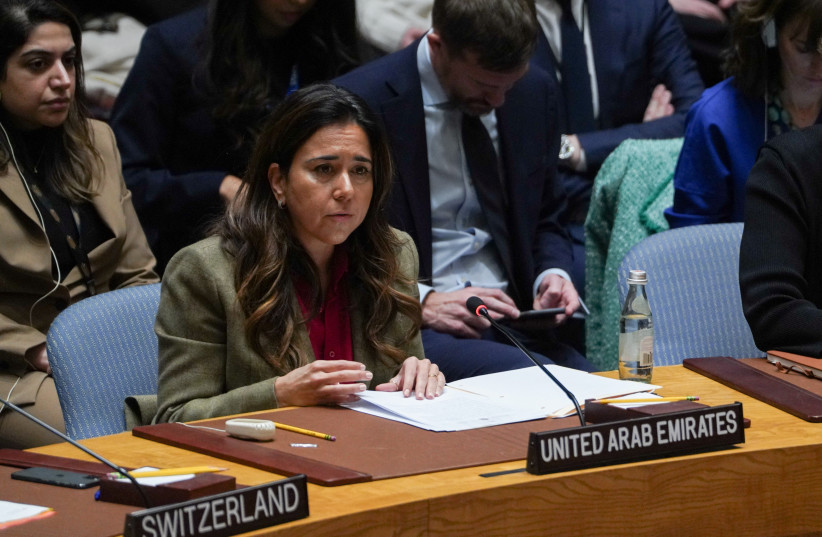The Palestinian Authority's ambassador to Cairo, Diab al-Louh, thanked the United Arab Emirates for its diplomatic efforts to push for more humanitarian aid for Gaza. The UN Resolution adopted on December 22 was an important development in the history of the war in Gaza, and the UAE played a key role. The resolution was penned by the UAE and was adopted with 13 votes in favor and two abstentions. The resolution called for more humanitarian assistance.
Last week, before the vote, Lana Zaki Nusseibeh, Emirati ambassador to the UN, said the resolution is the “product of extensive consultations and engagement between members of the Council, and concerned parties in particular Egypt and Palestine.” Now Al-Louh has thanked the UAE and given an interview to Al-Ain media in the UAE. He pointed to the importance of the resolution.
“The Emirati decision can be built upon later in more extensive and effective moves in order to stop this war immediately, urgently and sustainably,” the Palestinian diplomat said.
For the UAE, this is a triumph. It was able to get the resolution through without a US veto. Louh also praised this development, noting that it broke the traditional American objection to resolutions on Palestinian issues. “The Palestinian ambassador indicated that the Security Council’s adoption of the decision to expand aid to Gaza could be built upon in more widespread and effective moves to stop this war immediately, urgently, and sustainably, and to place the entire region and the situation in Palestine on the threshold of a new phase of security and stability, reconstruction and construction,” the Al-Ain report notes.

"Certainly, what happened was the result of intense diplomatic efforts from the UAE, after the vote on the resolution was postponed for several days, during which there were diligent efforts and communications from the UAE, Egypt, Palestine, the Arab group, and friends,” the Palestinian Authority ambassador said. Now Al-Louh has called for this resolution to be built upon. He also called for "committing Israel to implement the UN resolution, and to bring in humanitarian and relief aid that arrives to Egypt successively by land, sea, and air from brotherly and friendly countries to alleviate the severity of human suffering." He also thanked Egypt.
UAE playing important role in regional situation
The UAE has played an important role, often behind the scenes, over the last three months. This includes discussions about what comes next in Gaza. In early December UAE Ambassador to the UN Ambassador Lana Nusseibeh said, “the message is going to be very clear: We need to see a viable two-state solution plan, a road map that is serious before we talk about the next day and rebuilding the infrastructure of Gaza.” Al-Louh has been outspoken in the past about the Gaza war, condemning Israel on December 5. He also thanked Egypt for its support in mid-October. Hamas attacked Israel on October 7, causing the massive war in Gaza.
Back in August, prior to the war, Al-Louh was active in supporting discussions between the PA, Egypt and Jordan. Reports at the time indicated that Palestinian Authority President Mahmoud Abbas would travel to Egypt for a three-way meeting with Egyptian leader Abdel Fattah al-Sisi and the king of Jordan. At the time, Al-Louh said the important meeting would concentrate on “the latest developments regarding the Palestinian cause and coordinate positions to mobilize international support to end the suffering of the Palestinian people and achieve their legitimate national rights to freedom and independence and establish their state with East Jerusalem as its capital.”
The UAE has taken a keen interest in Gaza and the PA and what might come next in this conflict. It has aided Gazan civilians with a field hospital. In addition, last week the UAE foreign minister Sheikh Abdullah bin Zayed Al-Nahyan met Palestine Liberation Organization Secretary-General Hussein Sheikh in Abu Dhabi. According to Arab News “Sheikh Abdullah stressed the importance of prioritizing negotiations toward a framework for a two-state peace deal between the Israelis and Palestinians, WAM reported. The UAE has condemned the Oct. 7 Hamas attack and called on the Palestinian group to release hostages held in Gaza.”
Over the weekend, Turkish Foreign Minister Hakan Fidan spoke with Sheikh Abdullah bin Zayed Al Nahyan. “Underlining the importance of making maximum efforts to carry out humanitarian aid activities in the most effective way, Fidan said the ultimate goal is to ensure permanent peace in the region and the establishment of a Palestinian state,” Anadolu reported in Turkey.
These discussions happened amid reports that Egypt could help with a new hostage deal and suggestions about possible changes in the Palestinian Authority, as well as reports that Hamas leaders might even leave Gaza for exile. Unsurprisingly, Hamas leader Yahya Sinwar has claimed Hamas is performing well in Gaza, and Hamas official Osama Hamdan has rejected any new deal without an permanent ceasefire. Hamas has also told Iranian regime media they rejected various deals in the last weeks.
